- Home
- Herbie Brennan
Faerie Lord fw-4
Faerie Lord fw-4 Read online
Faerie Lord
( Faerie wars - 4 )
Herbie Brennan
Faerie Lord
Herbie Brennan
Prologue
‘Why don’t I stay here?’ Henry echoed. He knew he was plunging into one of his wretched waffles where he repeated what people said and cranked up his village idiot expression, but he didn’t seem to be able to do anything about it.
‘Yes,’ Blue said firmly. ‘Why don’t you?’
They were walking in the gardens of the Purple Palace and Blue looked absolutely gorgeous. Night stocks had begun to release their scent and there was torchlight reflected on the river. If there was ever a perfect setting for a romantic moment, this was it and he knew, beyond doubt, he was about to blow it. ‘Why don’t I?’ he asked.
‘Oh, Henry, I wish you wouldn’t do that,’ Blue said mildly. She reached out and took his hand, so that they were walking together by the water’s edge. ‘You don’t want to go home, I don’t want you to go home, Pyrgus doesn’t want you to go home, so why not stay?’
‘Pyrgus doesn’t want me to go home?’ Henry said, surprised, then realised how stupid that sounded and managed to say something more stupid still: ‘My mother would kill me.’ He looked at Blue in the vain hope of her understanding and added, ‘If I didn’t come home.’
Blue ignored it. ‘What are you going to do if you go home?’
Henry thought about it, then said vaguely, ‘Exams and things.’ It was anything but vague inside his head. He would do his exams and if he passed, which he probably would, he was set on a course that would take him on eventually to university, although not one of the good ones, not Oxbridge or anything like that. But whatever university he ended up in, he’d plod through to a mediocre degree, then become a teacher, because that’s what his mother wanted. She was a teacher. Actually she was the headmistress of a girls’ school. She kept telling him teaching was great because of the extended holidays, as if the measure of a good job was how long you could stay away from it.
‘You don’t like being at home,’ Blue said, ‘now your dad’s gone. You don’t like your mother…’
‘No, but I love her,’ Henry said gloomily. That was the trouble. To say he didn’t like his mother was an understatement. He couldn’t stand her. But that didn’t stop him loving her. He wondered if feeling guilty was a normal state of life.
‘She makes you do things you don’t want to do,’ Blue said as if he hadn’t spoken. ‘And she keeps doing things you don’t want her to do.’ She turned to look at him.
Like moving in Anais, he thought.
‘Like moving in Anais,’ Blue said soberly. She turned away and they continued their walk. ‘You’re not happy in the Analogue World any more. I know you’re not. Every time you go home, you look more miserable when you come back. And there’s nothing for you to do there – nothing important. Just, you know… stuff like school and exams. You don’t have a position, like you do here. Nobody respects you.’
Hold on a minute, Henry thought: this was getting painful. Except it happened to be true. Or nearly true. Charlie respected him. In fact he half suspected Charlie fancied him. But that was about it. Life at home was pretty miserable.
‘Whereas if you stayed here,’ Blue went on relentlessly, ‘you’d have important work. You’re already a hero -’
That was nonsense. If anything he was a villain because of what he’d tried to do to Blue, even though he hadn’t been himself when he did it, and after more people got to know about it…
‘- because of rescuing Pyrgus from Hael when he was Crown Prince, and if you don’t like your quarters at the Palace, I can make them give you something better and -’
‘No, no it’s nothing like that,’ Henry put in hurriedly. ‘I love my quarters at the Palace.’ They were about a billion times better than his room at home and he didn’t have his mother knocking on his door. He had servants for cripe’s sake!
Blue stopped, and since she still had hold of his hand, Henry stopped too. The sound of the water was overlaid by distant street noise from the city: the rumble of carts, the occasional call from a merchant. The city came alive at night in ways it never did during the day.
Blue said quietly, ‘I’m Queen of Hael now, not just Queen of Faerie. I need somebody to help me with that – you know, help me run things. Pyrgus is useless – all he wants to do is get into trouble and save animals – and Comma’s too young.’ She looked at him, then looked away.
It took a moment for Henry to figure what was going on here, but then it hit him like an avalanche. He blinked. ‘Wait… wait, you’re not asking me to take charge of Hell, are you?’
Blue still wasn’t looking at him, but she shook her head. ‘No, Henry,’ she said. ‘I’m asking you to marry me.’
One
Two years later…
‘What’s going on?’ Henry asked at once.
Hodge was staring out through the bars of the cat-carrier, an expression of fury on his face. Aisling was nursing a bleeding hand, an expression of outrage on hers.
‘Your cat bit me!’ she exclaimed. ‘Vicious brute should be put down.’
‘I told you to leave him alone,’ Henry said. He looked directly at his mother. ‘Why is he in the carrier?’
‘Henry, he bit your sister. Scratched her too. Luckily just on the hand. If he’d gone for her face, he could have scarred her. She could have lost an eye.’
‘I told her not to tease him,’ Henry said. ‘Why is he in the carrier?’
‘I didn’t tease him!’ Aisling shouted.
Henry rounded on her. ‘You’re always bloody teasing him! Ever since I brought him home. Picking him up and poking him and taking away his food. It’s no wonder he bit you. He’s an independent tomcat, not some sort of stuffed toy. He just wants to be left alone.’
‘I don’t think we need that sort of language,’ his mother said stiffly. She stared at Henry for a moment, then went on. ‘The point is that he attacked your sister and drew blood. There’s a risk of tetanus or cat-scratch fever. We can’t just ignore something like that. You know I was against his coming to live here in the first place.’
Henry looked his mother directly in the eyes. ‘Why is he in the carrier?’ he asked for the third time.
She looked away, to one side. ‘Oh, we’re not going to have him put down, if that’s what you’re thinking. Anais has gone to get the car. We’re taking him to the vet to be neutered.’
For a moment Henry simply stood there, stunned. Then he said, ‘You’re getting him neutered because he scratched Aisling? As a punishment?’
‘No, of course not,’ his mother said impatiently. ‘It’s just that he’ll be more placid when he’s neutered. Less likely to attack people.’ She sniffed. ‘And a lot cleaner.’
‘Mum, he’s never attacked anybody in his life except Aisling and that was only because she teases him. She teases him all the time. And what’s this about cleaner?’
‘Tomcats spray,’ his mother said. ‘They mark their territory. I don’t think even you want that sort of smell about the house.’
‘He doesn’t spray in the house,’ Henry said. ‘He’s never sprayed in the house. He may spray a bit in the garden, but that’s a different thing.’
‘It’s not something they can help,’ his mother said reasonably. ‘It’s territorial, just as I said, and it’s only a matter of time before he starts to do it in the house. We’ve all decided it’s better to do something about it before he actually starts.’
‘Not all,’ Henry said at once.’ We didn’t all decide anything. You and Aisling and, I suppose, Anais decided. I didn’t decide anything. I wasn’t even consulted – and he’s my cat!’ Technically, he was Mr Fogarty’s cat, but Mr Fogarty hadn’t
seen him in two years so he might as well be Henry’s cat.
‘Try to keep your voice down, Henry,’ his mother told him. She waited a moment, as if he needed time to control himself, then went on in her most reasonable tone. ‘We thought it would be a great deal easier on you if we simply went ahead. I know how much you love that old cat and that way you wouldn’t have to worry about the effect of anaesthetic or the operation going wrong. I actually thought you’d gone out.’
This was the way it had always been. His mother kept insisting every nasty little thing she ever did was for his own good. And it was worse since Anais moved in. Anais herself was all right – Henry quite liked her and she’d even sided with him about bringing Hodge home – but when it came to the things Henry’s mother really cared about, like that stupid little scratch on Aisling’s hand, she always seemed to get Anais on her side. Like now. Anais had gone to bring the car to take Hodge to the vet. Not because he sprayed in the house or would ever spray in the house, but because he bit Aisling in self-defence and Henry’s mother wanted to teach him a lesson.
It was the sort of thing Henry had had to put up with since he was a little boy. And with Dad long gone he was in an all-female household and it was steadily getting worse. But he wasn’t a little boy any more and he wasn’t going to put up with it.
Henry walked over to the carrier. ‘Not this time, Mum,’ he said and flicked the catch.
Hodge burst out of his cage like a rocket.
Two
‘You did what?’ Charlie exclaimed, grinning delightedly.
‘I let him out,’ Henry said. ‘There was a kitchen window open and we haven’t seen him since. I think he knew what they were going to do to him.’
They were sitting side by side on a park bench. The sole of Charlie’s left trainer was starting to come away and she was fiddling with it ineffectively. Henry thought she looked very nice in a cuddly sort of way now she’d started to put on a bit of weight. She left the shoe alone suddenly and asked, ‘Why didn’t you want him fixed?’
‘I’m not having Hodge fixed,’ Henry said. ‘Apart from anything else, he’s not really my cat.’
‘No,’ Charlie said. ‘He’s Mr Fogarty’s cat. You still haven’t heard from him?’
‘Mr Fogarty? No. No, I haven’t.’
Charlie said casually, ‘It’s been eighteen months.’
Actually it had been more than two years, but Henry had to be careful. The story was that Mr Fogarty had gone to see his daughter in New Zealand, leaving Henry to look after his house and his cat… a story that was getting thinner every month. Charlie hadn’t brought it up before, but Henry’s mother went on endlessly about the arrangement. It was only the regular cheques that stopped her pushing it too far. They were simply signed ‘A. Fogarty’ and she assumed the A stood for ‘Alan.’
‘You know what old people are like.’ Henry shrugged vaguely.
Charlie stared out across the ornamental lake, watching two swans glide gracefully towards the shore. ‘I was just wondering what you were going to do next year, when you go to uni.’
‘Who says I’m going to uni?’ Henry asked. ‘I mightn’t make the grades.’
‘Oh, you’ll make the grades all right,’ Charlie said. ‘And then you’ll be off. Where are you going to apply Oxford? Cambridge?’
‘No chance,’ Henry said. ‘I’m not that bright.’
This time Charlie shrugged. ‘Doesn’t matter. Wherever you pick it’ll mean moving away – there’s nothing locally. And if you move away, you won’t be looking after Mr Fogarty’s house or saving Hodge from a fate worse than death or seeing me or anything.’
Henry picked up the real worry at once. ‘Oh, I’ll be seeing you all right. I can come home at weekends.’
‘Not every weekend.’
‘No, maybe not. But, you know… some.’
‘Some?’
‘Yes,’ Henry said. ‘Some.’
‘Did you know swans mate for life?’ Charlie asked suddenly.
‘I think I read it somewhere.’
‘If one dies, the other one won’t mate again,’ she said as if he hadn’t spoken. ‘Not ever.’ She turned her head to look at him and licked her lips lightly. ‘Henry, I think we should stop.’
‘Stop what?’ Henry asked stupidly.
‘Going out together,’ Charlie said.
For once Henry had the house to himself when he got home. He found some yoghurt in the fridge, took it up to his room and sat down to write a letter.
Dear Mrs Barenbohm, he wrote, then paused.
It was getting complicated already. Angela Fogarty, Mr Fogarty’s daughter, had married an American industrialist called Clarence Barenbohm, then emigrated to New Zealand with a great deal of his money after the divorce. She insisted on using the Barenbohm name for everything except financial transactions, which she conducted under her maiden name.
Henry’s pen lurched into action again and wrote, I write to tell you that I do my A Levels this year and next year I hope to go to university. I don’t know where it will be (the university)
He paused again. He wasn’t even sure he would be going to university. Despite what he’d said to Charlie, he thought he’d probably get the grades all right, but when he tried to discuss his future with his mother, she got evasive, which was a bad sign. Part of him suspected there might be money worries, but she wouldn’t come clean and tell him. Anais claimed she didn’t know.
He shrugged. It didn’t matter. Even if he never went to uni, he wasn’t hanging around here when he left school. but there are no suitable educational establishments locally, he went on. This means that soon I will be unable to look after your father’s house and cat (Hodge), as I have done in the past, for very much longer.
I appreciate the money you sent – He crossed out sent and inserted have been sending, then stared at the page wondering if he should write it all out again. After a moment he decided it wasn’t a school essay and went on, but I very much regret I will be unable to keep on with our arrangement as it has been to date. I am writing to tell you this now while there is still time for you to make other arrangements or otherwise sell the house (Angela thought her father was dead and the house hers under the terms of his will; only Henry knew differently) or whatever it is you would want to do. Please write back to me marking the envelope ‘Personal’ and let me know what you decide to do and if I can help you further in any way apart from continuing our present arrangement beyond the New Year.
He signed the letter Henry Atherton, then immediately wrote a PS:
PS Some children broke a downstairs window, but I had it repaired with money from the Contingency Fund. He knew he should leave it at that, but somehow could not stop his hand writing: PPS I might be able to continue to look after Hodge (the cat) even after I stop looking after the house or even after I go to university. I wouldn’t want him put down or anything.
He sat staring at the words for a long time. Best not to mention the current little problem with Hodge or the fact that Henry had no idea where he was at the moment. Hodge was bound to come back – he was too old and fat and lazy to make his own way in the world any more. The trick would be to make sure Henry’s mother never got her hands on him.
… even after I go to university. How on earth would he look after a tomcat while he was attending university? But he’d think of something. He owed that much to Mr Fogarty. And to Hodge. His hands were trembling slightly as he folded the letter.
Since there was still nobody downstairs, he stole a stamp and an airmail sticker from his mother’s desk, then pulled his coat back on again; the sooner he posted this off the better. When he opened the front door, Hodge was waiting for him on the doorstep.
‘Ah, there you are,’ said Henry.
Against Hodge’s furious protests, Henry bundled him into the cat-carrier. ‘It’s for your own good,’ he hissed, sucking one thumb where the brute had drawn blood. ‘You really don’t want to hang around here.’ It was going to be a pain racing
off to Mr Fogarty’s house to feed Hodge in the middle of exams, but he couldn’t see any alternative. He knew his mother.
As he waited for the bus, Henry thought about Charlie and what she’d said about not going out together any more. He was surprised how little upset he felt. He’d been close friends with Charlie ever since they were little kids, but the romantic interest had started less than a year ago and to be absolutely honest, Charlie had been keener about that than he was.
The bus journey was a nightmare. Hodge wailed all the way and several passengers took to staring at Henry as if he was committing murder. But he settled once they left the bus, and by the time Henry was carrying him along Mr Fogarty’s cul-de-sac he was looking around through the mesh of the carrier as if he recognised the place.
Mr Fogarty’s house, the last one on the street, was looking distinctly the worse for wear despite Henry’s best efforts. Most of the trouble dated back to the days of Mr Fogarty’s own occupancy – he’d pasted brown paper on the bottom panes of the downstairs windows to stop people looking in, seldom bothered with minor repairs and had a habit of leaving half-eaten hamburgers to rot down the side of his sofa. Now it was unoccupied, the process of decay was visibly accelerating. Even if Henry hadn’t been planning to leave, it would make sense to sell the place before it fell down.
He carried the caged Hodge to the front door and let himself in – he had his own set of keys. Then he walked through to the kitchen, set the carrier on the floor and unlatched the side. Hodge stretched, looked around suspiciously, then walked out slowly.
‘Do you want your Whiskas now or would you prefer to go out the back and kill everything that moves?’ Henry asked him conversationally. Hodge walked to the back door and sat down facing it. He waited patiently. ‘So it’s the killing fields, is it?’ Henry said. He walked over, shot the bolt, then unlocked the back door.
Two strangers were standing on the lawn outside.

 Through the Wardrobe
Through the Wardrobe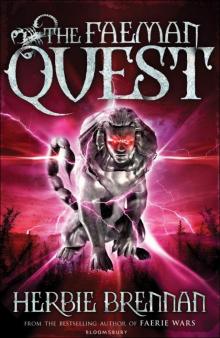 The Faeman Quest fw-5
The Faeman Quest fw-5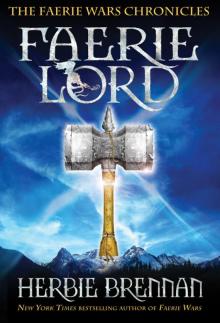 Faerie Lord
Faerie Lord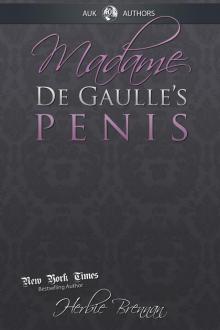 Madame de Gaulle's Penis
Madame de Gaulle's Penis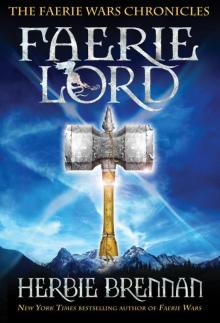 Faerie Lord fw-4
Faerie Lord fw-4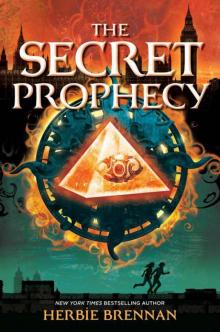 The Secret Prophecy
The Secret Prophecy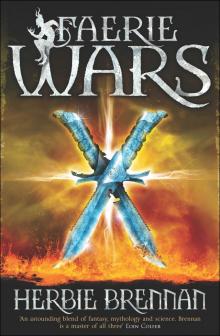 Faerie Wars
Faerie Wars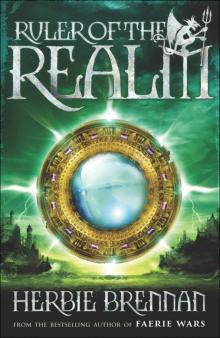 Ruler of the Realm
Ruler of the Realm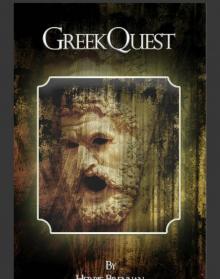 GreekQuest
GreekQuest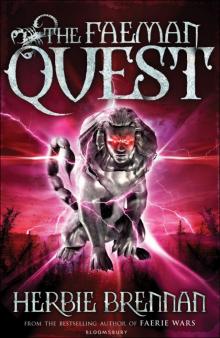 The Faeman Quest
The Faeman Quest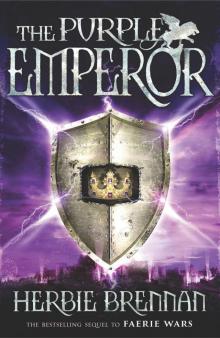 The Purple Emperor
The Purple Emperor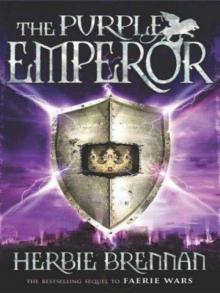 The Purple Emperor fw-2
The Purple Emperor fw-2 RomanQuest
RomanQuest The Doomsday Box
The Doomsday Box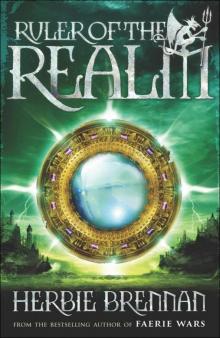 Ruler of the Realm fw-3
Ruler of the Realm fw-3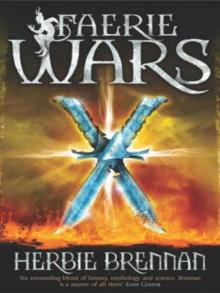 Faerie Wars fw-1
Faerie Wars fw-1